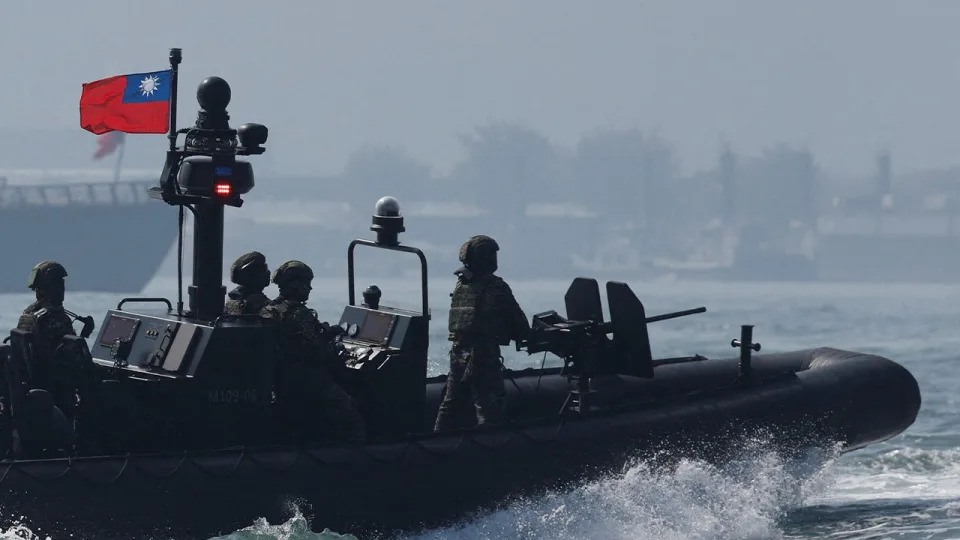A bipartisan U.S. congressional delegation pledged continued support for Taiwan on Thursday, days after Congress approved $300 million in military aid for the self-governed island that’s claimed by China.
Taiwan Presidential Office, Taiwan's President Tsai Ing-wen, right, poses for photos with Rep. Jack Bergman, R-Mich., in Taipei, Taiwan on Thursday, March 28, 2024. Bergman leads a bipartisan U.S. congressional delegation that pledged continued support for Taiwan on Thursday, days after Congress approved $300 million in military aid for the self-governed island that's claimed by China.
Congress also approved $400 million on Saturday to counter the Chinese government’s influence in the region, as part of its Defense Appropriations Act.
China regards Taiwan as a breakaway province to be brought under its control, by force if necessary. Beijing sends warships and fighter jets near the island daily, as it ramps up its military pressure.
The United States, like most nations, doesn’t recognize Taiwan as a country. However, it is bound by U.S. laws to ensure the island can defend itself and considers all threats to Taiwan as a matter of “grave concern.”
The delegation led by Rep. Jack Bergman, who chairs the House Intelligence and Special Operations Subcommittee, sought to reassure Taiwan’s leadership of continued support.
“We will continue to assure our colleagues that the strategic relationship is key for the future security of the region,” Bergman said during a meeting with Taiwanese President Tsai Ing-wen.
“This includes a strong Taiwan maritime strategy and how we can work together on shared goals to counter China on their increasingly aggressive actions in the region,” the Michigan Republican said.
Tsai thanked the Biden administration and Congress for helping to bolster Taiwan’s self-defense.
“This support will continue to strengthen the Taiwan-U.S. partnership,” she said.
In Beijing, a Defense Ministry spokesperson said China firmly opposes U.S. arms sales to what he called China's Taiwan region.
"We strongly demand that the U.S. side abide by the one-China principle, refrain from undermining China’s sovereignty and security interests, and not interfere in China’s internal affairs,” Senior Col. Wu Qian said at a monthly briefing.
The U.S. delegation also includes Democratic Reps. Donald Norcross from New Jersey and Jimmy Panetta from California. The lawmakers arrived in Taiwan on Wednesday and are to stay until Friday.
They also met with Taiwanese Vice President and President-elect William Lai and with Vice President-elect Bi-khim Hsiao. Taiwan’s new administration takes office on May 20.
China prohibits countries it has diplomatic relations with from having formal exchanges with Taipei and regularly criticizes U.S. officials’ visits to the island.
A trip by then-House Speaker Nancy Pelosi to Taiwan in 2022 resulted in China dispatching warships and military aircraft around the island and freezing a series of exchanges, including military communications, with the U.S.
Beijing and Washington restored military-to-military contacts after a flurry of diplomatic exchanges in recent months culminated in a meeting between the country’s presidents in San Francisco in November.
Taiwan has expressed concern in recent months about China’s expansion of military bases near the island but says it wants to avoid an escalation in tensions with Beijing.
Taiwan stands as major line of defense against global war with China, critical for US security
Taiwan, an island slightly bigger than the state of Maryland, carries enormous strategic importance for not only U.S. security and prosperity, but also in preventing a global war, a special report by the Heritage Foundation warned Wednesday.
Tensions between the U.S. and China over Taiwan have been on the rise over the last decade, and many have questioned why the U.S. would risk a potential war with its chief rival over a relatively small island.
"The security and prosperity of the United States depend to a shocking extent on a secure Taiwan that functions independently of the [People’s Republic of China] PRC," research fellow and China expert for the Heritage Foundation Michael Cunningham wrote in a report titled "The American case for Taiwan."

"A change in Taiwan’s status might not directly threaten the U.S. homeland in the immediate term, but it would irreversibly alter regional dynamics in ways that would benefit America’s chief geopolitical adversary and make every American less safe," he said in the report first viewed by Fox News Digital.
A secure Taiwan became a top issue following the end of World War II, when the U.S. entered the Cold War with the Soviet Union and its fight against communism kicked off.
Cunningham pointed to a previously classified memorandum prepared by General Douglas MacArthur in 1950 that said China would "increase by 100 percent" its ability to deploy air combat options and strike American bases in places like Japan and the Philippines should they control the island of Taiwan.
"Little has changed in the decades following," he noted.
Some 80,000 U.S. troops are stationed in Japan and South Korea, but a Chinese-controlled Taiwan would not only serve as a better launch point for air and missile operations, it would enable Beijing to exert greater control over international waters that serve as major trade and security transportation routes, seriously threatening top U.S. allies.
"The [People’s Liberation Army] PLA handbook outlines a post-Taiwan unification plan to use blockades to limit Japan’s imports of raw materials gradually until its ‘national economy and war-making potential will collapse entirely’ and there is ‘a famine within the Japanese islands’," Cunningham wrote in reference to China’s military. "Were China ever to execute such a plan, Japan would be at its mercy."
Cunningham also argued that even if China did not attempt to leverage its control over international waters, there would still likely be a "crisis of confidence" in either Washington’s willingness or ability to stop China from achieving regional hegemony.
This sentiment could have serious consequences when it comes to security and trade and could prompt some nations in Southeast Asia to bolster ties with Beijing, further weakening the U.S.’ influence in the region.
However, while some nations may kowtow to a stronger Beijing, many nations in the region would not, and the threat of a global war would only increase.
"China is the biggest threat to most regional actors, and it has territorial disputes with several of them," Cunningham wrote.
The China expert pointed out that the regional disputes are "serious political issues" and therefore are more likely to have "explosive" consequences should Beijing attempt to shift the power dynamics across Asia.
"The U.S. security presence is widely viewed as the main factor preventing an outbreak of great-power conflict in a region that is so critical to global economic and political affairs that such a conflict could easily spread to assume a global scale," Cunningham warned.
"If China gained control of Taiwan, it would set in motion a series of events that could make every American less secure."



